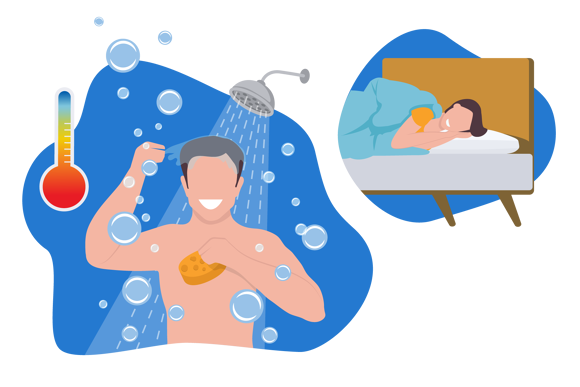Why do we yawn?
We all yawn, but many of us don’t fully understand what triggers this important reflex.
According to a 2022 study [1], there is still no scientific consensus on the exact reasons behind yawning.
However, that doesn’t mean there aren’t recent studies offering fascinating theories to consider.
- Yawning after a long presentation: Could it be your brain's way of unwinding after passive activity?
- Yawning after seeing someone else yawn: Could it be empathy at play, mirroring the emotions you observe in others?
- Yawning after a workout: Perhaps your body is trying to cool down after the exertion?
Let’s dive deeper into how to stop those yawns and explore the three leading theories behind the age-old question: “Why do we yawn?”.
What exactly is a yawn?
A yawn [2] is a physiological reflex involving a deep inhalation [3] and stretching of the jaw and facial muscles, often followed by an audible exhalation.
Yawning may or may not be accompanied by stretching and typically lasts between 5 to 6 seconds [4].
It’s observed across a variety of species, from humans and chimpanzees to birds and reptiles, suggesting an evolutionary significance beyond mere boredom.
Yawning can be:
- Involuntary: A reflex you can’t consciously control.
- Contagious: Seeing someone yawn increases your likelihood of yawning in response.
- Universal: Found across numerous species, including chimpanzees, dogs, cats, and even fish.
- Variable: The frequency and duration of yawns can differ between individuals and species.
And of course, sometimes we enjoy yawning, and sometimes we don't.
Some theories on why we yawn
Even though scientists haven't figured out exactly why we yawn, there are a few key theories.
1. Fatigue, boredom, or sleepiness
Yawning isn’t just a sign of tiredness or a lack of sleep.
One theory [5] suggests it’s the body’s way of keeping us alert, especially during dull or passive activities like attending a long lecture.

In fact, studies [6] have shown that yawning is often followed by increased brain activity, helping to boost alertness. 🧠
You’re more likely to yawn:
- After waking up or before going to sleep
- During monotonous or stressful tasks
- When feeling exhausted or experiencing sleep debt.
If you frequently find yourself yawning near someone or feel like yawning but can’t, other factors like stress or the need to relax could be at play.
2. Regulating brain temperature
Did you know that yawning might be linked to brain thermoregulation?
Research [7] suggests that yawning helps cool the brain, acting as a natural ventilation system. ❄️
In warm or stuffy environments, yawning may allow you to inhale cooler air, which helps regulate the temperature of the blood [8] circulating in your brain.
Conversely, we tend to yawn less in colder weather when this cooling isn’t as necessary.
3. A social reaction, empathy, or just contagious
Have you ever suppressed a yawn after seeing someone else yawn?

This common phenomenon may be tied to empathy, according to a study by Baylor University [9].
- Individuals with higher levels of empathy [10] are more likely to yawn when others do. 🫂
- Conversely, those with lower empathy levels tend to be less responsive to contagious yawns.
Studies [11] also indicate that contagious yawning isn’t solely about empathy; it may also be a social reaction, strengthening bonds and connections between people.
Tips to stop yawning
We’ve all been there: one yawn after another, making it hard to focus and even creating discomfort when trying to fall asleep. 😮💨
While the occasional yawn is completely normal, excessive yawning can be draining.
Sometimes, the solution to excessive yawning [12] might be as simple as creating a better sleep environment.
Here are some tips to help manage those yawns:
💨 Take deep breaths
A simple yet effective tip is to breathe deeply through your nose, like you would during breathwork or meditation.
Why?
Your body might be signalling a need for more oxygen, and those yawns could be its way of "reminding" you.
Deep, controlled breaths bring in fresh air, which may help reduce the urge to yawn.
In fact, a 2007 study [13] found that nasal breathing completely stopped contagious yawning in participants.
💤 Improve your sleep environment
Excessive yawning can be a telltale sign of underlying sleep issues.
But that's no need to worry - by optimising your sleep hygiene and improving your bedroom environment, you can create the ideal setting for a restful night’s sleep and wave goodbye to those frequent yawns.
🏃 Get moving
When stuck in a routine or monotonous activity, your brain can slow down, leading to frequent yawning.
Shaking things up, even with small adjustments or a quick burst of activity, can re-energise your mind and help curb the yawns.
Can yawning too much be harmful?
While the occasional yawn is perfectly normal, frequent yawning could signal something more serious.
But when does yawning become excessive?
On average, adults yawn around 9 times a day [1].
However, if you notice that your yawning is more frequent or accompanied by fatigue and drowsiness, it could be a sign of excessive yawning.
Below, we’ve outlined some possible causes:
Excessive sleepiness
The most common cause of frequent yawning is a potential sleep deficit [14].
This could stem from a string of restless nights or be a symptom of underlying sleep disorders, such as sleep apnoea, circadian rhythm disruptions, or narcolepsy.
Side effects of medication
Although less common, certain medications, such as antidepressants and antihistamines, can cause yawning as a side effect [15].
Neurological disorders
Conditions such as meningitis, encephalitis, brain tumours [16], or even Parkinson’s disease could be underlying causes of excessive yawning.
However, these are much rarer and are typically accompanied by other noticeable symptoms.
If excessive yawning persists or is accompanied by other symptoms, it’s important to consult a doctor to investigate potential causes and explore appropriate treatments.
Final thoughts on yawning
Yawning is a natural reflex with fascinating theories behind its purpose, from cooling the brain to fostering social connection.
While usually harmless, frequent or excessive yawning could signal underlying health issues, so it's always worth paying attention to your body and seeking medical advice if needed.












Alternatively, message us directly via the Contact Us page.